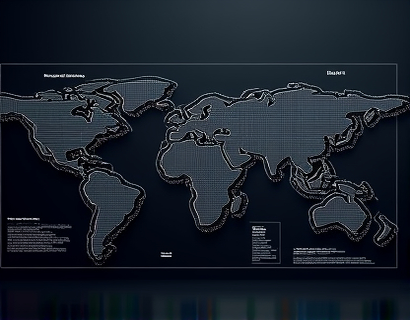Decentralized Corporation Software: Streamlining Business Formation in the Digital Age
The landscape of business formation is undergoing a significant transformation with the advent of decentralized technology. In an era where digital solutions are redefining traditional processes, the emergence of decentralized registered corporations software stands out as a revolutionary tool for entrepreneurs. This software is designed to empower business owners by streamlining the registration process, ensuring compliance, and enhancing security and accessibility. The goal is to revolutionize corporate management in the digital age, making the formation and operation of businesses more transparent, efficient, and secure.
Understanding Decentralized Registered Corporations Software
Decentralized registered corporations software leverages blockchain technology and decentralized networks to create a new paradigm for business registration and management. Unlike traditional methods that rely on centralized authorities and intermediaries, this software operates on a peer-to-peer network, eliminating the need for middlemen. This shift not only reduces costs but also increases transparency and security.
The core functionality of this software includes automating the registration process, maintaining an immutable record of corporate data, and facilitating seamless compliance with regulatory requirements. By utilizing smart contracts, the software ensures that all transactions and updates to the corporate record are executed automatically and transparently, reducing the risk of human error and fraud.
Streamlining the Registration Process
One of the most significant advantages of decentralized registered corporations software is its ability to streamline the business registration process. Traditionally, forming a corporation involves a complex and time-consuming series of steps, including filing paperwork, paying fees, and obtaining approvals from various authorities. This process can be daunting for new entrepreneurs, often leading to delays and increased costs.
With decentralized software, the registration process is significantly simplified. Entrepreneurs can initiate the process online, filling out digital forms that are verified and processed automatically. The use of blockchain ensures that all documentation is stored in a secure, tamper-proof ledger, accessible to authorized parties. This not only speeds up the registration process but also makes it more user-friendly and accessible.
For instance, a startup founder can create a digital version of the articles of incorporation, which is then verified by the network. Once verified, the incorporation details are added to the blockchain, creating a permanent and transparent record. This record can be accessed by stakeholders, regulators, and even potential investors, enhancing trust and accountability.
Ensuring Compliance and Regulatory Adherence
Compliance with legal and regulatory requirements is a critical aspect of business operation. Decentralized registered corporations software addresses this challenge by integrating real-time compliance checks and updates. The software is designed to stay updated with the latest regulations across different jurisdictions, ensuring that businesses remain compliant without the need for constant manual monitoring.
Smart contracts play a pivotal role in this process. These self-executing contracts with the terms directly written into code can be programmed to trigger specific actions based on predefined conditions. For example, a smart contract can automatically update the corporate record when a new shareholder joins or when financial reports are submitted. This ensures that all compliance-related tasks are handled efficiently and transparently.
Moreover, the decentralized nature of the software means that there is no single point of failure or control. This reduces the risk of corruption and manipulation, as all transactions and updates are recorded on a distributed ledger. Regulators can access the blockchain to verify compliance, ensuring that businesses operate within the legal framework without the need for extensive audits.
Enhancing Security and Accessibility
Security is a paramount concern for any business, especially when dealing with sensitive corporate data. Decentralized registered corporations software enhances security through advanced cryptographic techniques and decentralized storage. Each piece of data is encrypted and stored across multiple nodes in the network, making it extremely difficult for unauthorized parties to access or alter the information.
Accessibility is another key benefit. With traditional systems, accessing corporate records often requires physical presence or complex authentication processes. Decentralized software allows stakeholders to access and update records from anywhere in the world, using any internet-connected device. This not only improves efficiency but also promotes inclusivity, enabling remote teams and international collaborations to function seamlessly.
Furthermore, the transparency provided by blockchain technology builds trust among stakeholders. Shareholders, investors, and partners can verify the authenticity of corporate data in real-time, reducing the need for intermediaries and intermediaries' fees. This level of transparency can also attract more investors, as it demonstrates a commitment to ethical and transparent business practices.
Case Studies and Real-World Applications
Several companies and startups have already begun adopting decentralized registered corporations software, achieving significant benefits. For example, a fintech startup used this software to streamline its incorporation process, reducing the time from several months to just a few days. The transparency and security features of the platform also helped the startup attract a diverse group of international investors, who valued the trustworthy and efficient process.
Another case involves a global software development company that utilized decentralized software to manage its international operations. The company reported a significant reduction in compliance-related issues and administrative overhead. The ability to access and update corporate records in real-time across different countries enhanced collaboration and decision-making, leading to faster project delivery and higher customer satisfaction.
Challenges and Future Prospects
While the benefits of decentralized registered corporations software are clear, there are still challenges to overcome. One of the primary hurdles is the need for widespread adoption and regulatory acceptance. As decentralized technology is relatively new, many jurisdictions are still grappling with how to regulate these innovative solutions. However, as more businesses adopt this technology and demonstrate its effectiveness, regulatory frameworks are likely to evolve to support and integrate decentralized solutions.
Another challenge is the technical complexity associated with blockchain and decentralized systems. Not all entrepreneurs may have the expertise to fully leverage these technologies. To address this, educational resources and user-friendly interfaces are essential. Platforms can offer tutorials, support services, and intuitive interfaces to make the technology accessible to a broader audience.
Looking ahead, the future of business formation and management is increasingly decentralized. As more companies recognize the advantages of this approach, we can expect to see further innovations and integrations. For instance, combining decentralized registered corporations software with other blockchain applications, such as smart property titles and decentralized finance (DeFi), can create a comprehensive ecosystem for business operations. This ecosystem would offer unparalleled levels of security, transparency, and efficiency, truly transforming the way businesses are formed and managed in the digital age.
Conclusion
The advent of decentralized registered corporations software marks a significant milestone in the evolution of business formation and management. By streamlining the registration process, ensuring compliance, and enhancing security and accessibility, this technology empowers entrepreneurs to focus on growth and innovation. As the digital landscape continues to evolve, decentralized solutions will play an increasingly vital role in shaping the future of business. Embracing these advancements not only optimizes operations but also sets the stage for a more transparent, efficient, and secure business environment.









































